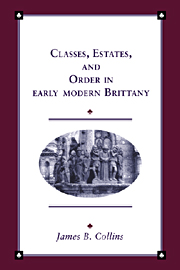Book contents
- Frontmatter
- Contents
- Preface
- List of abbreviations
- Glossary of French terms
- Introduction
- 1 The Breton economy in the sixteenth and seventeenth centuries
- 2 Elements of Breton society
- 3 Institutional structures of political control – financial and judicial organization
- 4 The Estates of Brittany and the Crown, 1532–1626
- 5 The Estates of Brittany and the Crown, 1626–1675
- 6 The burden of Breton taxation
- 7 The problem of order
- Conclusion
- Appendix
- Bibliography
- Index
- CAMBRIDGE STUDIES IN EARLY MODERN HISTORY
3 - Institutional structures of political control – financial and judicial organization
Published online by Cambridge University Press: 06 October 2009
- Frontmatter
- Contents
- Preface
- List of abbreviations
- Glossary of French terms
- Introduction
- 1 The Breton economy in the sixteenth and seventeenth centuries
- 2 Elements of Breton society
- 3 Institutional structures of political control – financial and judicial organization
- 4 The Estates of Brittany and the Crown, 1532–1626
- 5 The Estates of Brittany and the Crown, 1626–1675
- 6 The burden of Breton taxation
- 7 The problem of order
- Conclusion
- Appendix
- Bibliography
- Index
- CAMBRIDGE STUDIES IN EARLY MODERN HISTORY
Summary
INSTITUTIONAL DEVELOPMENT TO 1598
fudicial institutions
Henry II created the preeminent Breton judicial institution, the Parlement, in 1554. There had been no permanent high court under the dukes but they created periodic panels to hear their most important cases. The last duke, Pierre II, institutionalized two rival courts, a special king's council and an early Parlement. The duchess Anne (and the king) continued both courts, although the Parlement did not receive official recognition as a permanent court. The king preferred to use a similar French institution, the Grands fours, to hear Breton cases in the first half of the sixteenth century. Many of the judges of these Grands fours sittings became members of the Parlement of Brittany.
The earliest judges of the Parlement came from a mixture of three groups: members of the local legal elite; maîtres des requêtes from Paris; and Breton nobles. The edict of creation divided the offices into two categories, for Breton and non-Bretons. The nobles clustered into the former category, the legal class into the latter. Even the old nobles (those whose heritage can easily be traced back to noble musters of the early fifteenth century or beyond) were often from families that had done judicial rather than military service in the early sixteenth century. For example, François Bruslon, one of the original Breton councilors, came from a family whose nobility can be traced back to the fourteenth century; the investigating commission of 1668 found them to be of “ancient extraction of knighthood.” Yet Bruslon's father, Yves, had been procureur of the bourgeois of Rennes in the 1480s. Bruslon himself had been a councilor of the Grands fours of Brittany since 1533 and was later (1549) named a maître des requêtes.
- Type
- Chapter
- Information
- Classes, Estates and Order in Early-Modern Brittany , pp. 108 - 153Publisher: Cambridge University PressPrint publication year: 1994



